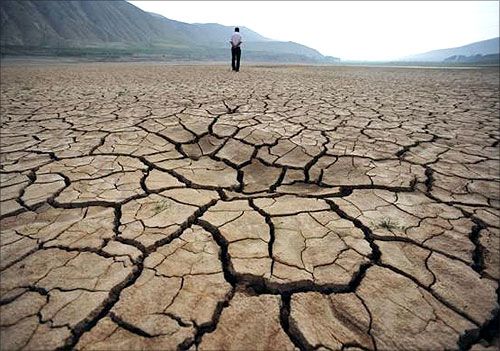 The Supreme Court on Friday asked the Centre to release all the outstanding and necessary funds for the Mahatma Gandhi National Rural Employment Gurantee Act scheme to the states and directed it to pay compensation for delayed wages to the farmers in drought-affected areas.
The Supreme Court on Friday asked the Centre to release all the outstanding and necessary funds for the Mahatma Gandhi National Rural Employment Gurantee Act scheme to the states and directed it to pay compensation for delayed wages to the farmers in drought-affected areas.
"The government can't hide behind a smokescreen for lack of finances," the court said.
A bench comprising Justices M B Lokur and N V Ramana directed the states to appoint commissioners for effective implementation of provisions of National Food Security Act and strengthening of public distribution system especially in drought-hit areas.
The bench also directed the government to set up Central Employment Guarantee Council as envisaged in the statute and to ensure compensation for crop loss in such areas.
The apex court said that states cannot say they will not follow the law enacted by Parliament and "rule of law binds everyone including the states".
The bench directed that mid-day meal should be continued throughout the summer season in drought-affected areas.
The apex court, however, refused to appoint court commissioners for implementation of the directions given by it, saying it is not disposing of the plea and will hear the matter on August 1.
The apex court pronounced three-part judgement on Friday concerning different issues while the first one was pronounced on May 11.
The court had on May 11 said if the state governments maintain an "ostrich-like attitude" towards disasters like drought then the Centre cannot wash off its hands from the constitutional responsibility as the "buck stops" with it in matters concerning common people.
It had passed a slew of directions on the issue of tackling a drought-like situation.
The bench had said that if Centre and state governments fails to respond to a developing crisis or a crisis in the making then the judiciary "can and must" consider issuing appropriate directions but "a Lakshman rekha" must be drawn.
The apex court had noted that "lack of will" was amply demonstrated in this matter in which states of Gujarat, Bihar and Haryana were "hesitant to even acknowledge, let alone address, a possible drought-like situation or a drought by not disclosing full facts about the prevailing conditions in these states."
It had said it was "quite surprised" that neither a National Plan has been drawn nor there is a National Disaster Mitigation Fund even after 10 years of the enforcement of the Disaster Management Act, 2005.
The apex court, which had noted that around one-fourth of the total population of the country was affected by drought-like situation, had also directed the Centre to establish a National Disaster Mitigation Fund within three months.
While issuing a slew of directions, the court had asked the Centre to constitute within six months a National Disaster Response Force with its own regular specialist cadre.
It had directed the secretary, agriculture ministry, to urgently hold a meeting within a week with the chief secretaries of Bihar, Gujarat and Haryana to review the apparent drought situation with all the available data.
It, however, had clarified that other issues raised by the petitioner NGO, Swaraj Abhiyan, would be dealt in subsequent orders as the issues raised were in a sense quite disparate, though linked to the drought situation.
The PIL filed by the NGO had alleged that parts of 12 states of Uttar Pradesh, Karnataka, Madhya Pradesh, Andhra Pradesh, Telangana, Maharashtra, Gujarat, Odisha, Jharkhand, Bihar, Haryana and Chattisgarh were hit by drought and the authorities were not providing adequate relief.










